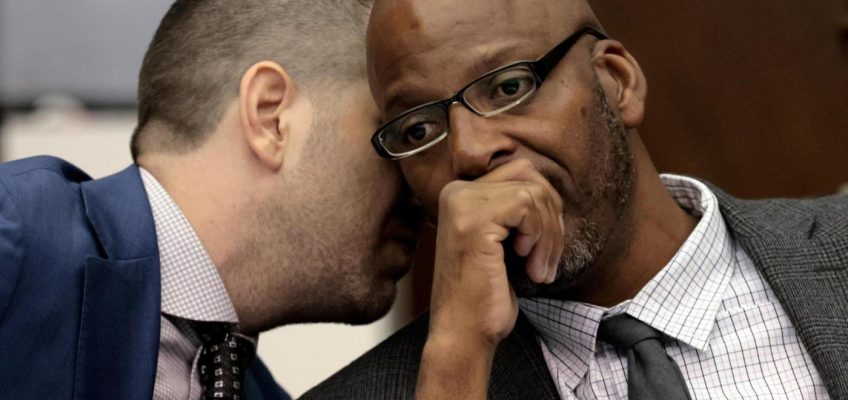Father Paul Treacy prides himself on overseeing a 168-year-old Catholic church founded by German immigrants who came together around the mission of supporting the most vulnerable among them. From its prominent location in downtown St. Paul, the Church of the Assumption’s Romanesque columns birthed the Catholic Charities of St. Paul and Minneapolis, as well as an orphanage, which became known as St. Joseph’s Home for Children.
In between 15 weekly masses, many of its 3,000 members have maintained close relationships with St. Paul institutions that serve the neediest, including Catholic Charities’ Dorothy Day campus, the two-building homeless shelter around the corner, the Listening House day program and the Little Sisters of the Poor.
“We’ve been here on these streets and walking with our neighbors who are in need since forever,” said Treacy, who has led the Church of the Assumption for seven years.
Some parishioners have called it ironic, then, that Treacy would become the public face of opposition to Catholic Charities’ latest endeavor. The charity hopes to sell its Mary Hall building, vacant for several years, to the developer Aeon, to convert the building into 88 units of affordable housing for the very poor. Aeon has promised to install support services aimed at residents who previously were homeless.
The church received a city notice last month indicating the arrangement would require a major zoning variance. City rules require a 600-foot separation between two “congregate living facilities,” and Mary Hall and the Higher Ground/Dorothy Day Center campus — which provides supportive housing for 370 residents and housed nearly 2,500 people in emergency overnight shelter last year, in addition to providing meals and day services — sit just 60 feet apart.
The church raised objections to the St. Paul Board of Zoning Appeals but was overruled when the board voted 5-0 to grant the variance June 24. Treacy, backed by the church’s leadership team, has filed an appeal, which is scheduled to be heard by the city council on Aug. 7.
Over-saturation of the poor?
Treacy’s concern is that the area around the Dorothy Day Center and the Assumption Church — the veritable entrance to downtown St. Paul — appears overloaded with people in need, with evidence of sidewalk encampments, litter, vandalism and obvious drug sales during daylight hours. He said even some clients of the Higher Ground shelter have complained to him that the most vulnerable are being overconcentrated in one area, making them even more open to predators.
With state funding, Catholic Charities is building a temporary fence around certain corners of its campus this year to control the flow of foot traffic, and then a more permanent fence next year. Treacy fears that will only push loiterers further into surrounding streets.
“Right now, the streets are in really tough shape, and it’s putting a strain on all of the support systems, including Catholic Charities and first responders,” said Treacy, who is calling on the city to create a citywide service plan for the homeless that moves services beyond downtown. “It’s creating concern, including among our own people. It’s time for a timeout.”
Michael Goar, outgoing president and chief executive officer of Catholic Charities — the largest provider of shelter services in Ramsey County — said he’s met with Treacy and is open to feedback and making adjustments to services, within reason. At the St. Paul Opportunity Center, the day building on the Dorothy Day campus, demand for services ranging from hot meals to showers and dental appointments grew some 35% last year.
“I don’t deny there’s a lot of folks coming in, but there’s a need for folks to be served,” Goar said. “If not us, then who? I’m all for other people sharing the load, but I don’t see anybody else raising their hand and stepping up.”
Forest Lake to start second search for new city administrator
Anoka County selects a new county administrator
Ramsey and Washington counties to take over stretch of Century Avenue from state
I-35 lane restrictions in Forest Lake begin Monday
Pat Owens, mayor who led Grand Forks through historic 1997 flood, dies at 83
Goar — who spent seven years in an orphanage in South Korea, rejected by most because his father was a Black American — said his own experience as an adoptee into a welcoming family in South Minneapolis provides him with special insight into the haves and have-nots of society.
“I know what it’s like to grow up in an institution where no one gives a (expletive), and I know what it’s like to have a loving family who cares for you,” said Goar on Thursday. “I should probably be dead somewhere in some gutter, but I’m not. … (The clients we serve) are in those circumstances. We can’t walk away. We’ll give you a helping hand when you need it. We’ll give you a hug when you need it. Give us a little grace. We’re trying to do our best.”
A citywide plan for poverty?
Treacy wants the city to explore how best to spread out supportive services beyond downtown. He’s also calling on the state to work with communities to help the poor in their own backyard, instead of leaving those most in need to seek services in urban areas like St. Paul and Minneapolis.
“They selected Mary Hall because Mary Hall is available. I think it would be healthier to take a step back and say, ‘How does this fit into the broader city plans?’. Supportive housing and affordable housing are an important enough topic to be part of a city plan,” Treacy said. “Then you can understand what’s a healthy amount for each neighborhood to absorb.”
Some parishioners have taken Treacy to task for his stance, while others have quietly agreed.
Elsewhere in the Twin Cities, a group of Black ministers filed legal action against the state of Minnesota and the Metropolitan Council last year, alleging that state funders and regional planners have partnered with nonprofit housing developers to concentrate the poor in areas ill-equipped to help them out of poverty, particularly along the Green Line transit corridor.
“We need housing of all kinds in downtown St. Paul, including supportive and affordable housing,” said Joe Spencer, president of the St. Paul Downtown Alliance, a coalition of downtown businesses working with City Hall, in an email. “That being said, the proposed development would create a concentration of services for people in need that is unsustainable. Adding more supportive housing in this particular area would likely increase predatory and illegal activities, making it a less-than-ideal location for this development.”
Underscoring tensions is the difficult backdrop created by crime trends, an emptier downtown in the era of remote work and what Treacy described as a general imbalance as major institutions like St. Joseph’s Hospital, which closed in stages between 2020 and 2022, depart the area. The high cost of housing, the opioid epidemic and other factors also loom.
Fewer people, more crime
The pandemic years coincided with a national crime surge, which since has declined but still appears heightened compared to even five years ago. St. Paul’s homicide rate, for instance, began increasing in 2019 and hit a new record in 2022 with 40 homicides. There were 32 homicides last year. By comparison, St. Paul averaged 17 homicides a year between 2010 and 2018.
Reported crimes against individuals downtown were down 5% this year through July 21, compared to the same period last year, according to St. Paul Police. Crimes classified as general crimes against society — such as loitering, trespassing, disorderly conduct, drug use or sidewalk gambling — were down 17%. Property crimes have been flat.
In downtown St. Paul, some signs of over-saturation are readily apparent. Inspectors who approve federal Section 8 housing vouchers have begun canceling vouchers at the Lowry Apartments on Wabasha Street, given the condition of the building. Longstanding tenants said the property owner began moving homeless residents into the Lowry during the pandemic, without commensurate services, adding to safety concerns.
At the Press House Apartments at 345 Cedar St., a former newspaper headquarters that was converted into affordable housing, police were called to residences there on a near-daily basis last year. A man allegedly killed his girlfriend there last November, hid her body under an air mattress and then stepped in front of a light-rail train, incurring serious injuries.
The St. Paul City Council, which acts in a quasi-judicial role during zoning appeal hearings, cannot legally comment or involve itself in the dispute beforehand.
Goar said he met with Treacy in recent days, and he’s open to exploring solutions to nuisance issues where they exist, but he can’t turn his back on his mission.
“Father Paul talked about creating space where there would be more frequent presence of police,” Goar said. “We’re meeting with the mayor’s office as well, talking about safety and security. What can we do differently as an organization? If there are things we can do differently, within our means, we’re going to do that.”
St. Paul City Council approves expansion of Downtown Improvement District
Eight bids for Lowry Apartments, but new owners can’t come soon enough for tenants
‘A place of choice and opportunity’: An interview with Mayor Melvin Carter on the future of downtown St. Paul
The new Minnesota Yacht Club Festival enjoys breezy opening on Harriet Island
What to know if you’re headed to the Minnesota Yacht Club Festival




